Understanding George Orwell: Animal Farm Explained
Animal Farm serves as a timeless allegory for the dangers of totalitarianism and the betrayal of revolutionary ideals.
George Orwell, who understood dictatorships and totalitarianism better than anyone, wrote a powerful and witty allegorical book titled Animal Farm. In this book, Orwell brilliantly lays out how idealistic revolutions, which aim to solve oppression, are often a cure that is worse than the disease.
Animal Farm begins on Manor Farm, where the animals are mistreated by their human owner, Mr. Jones. Inspired by a wise boar named Old Major, the animals of Manor Farm unite in a vision of rebellion for a society where all animals are equal and resources are endlessly abundant. After Old Major's death, the animals overthrow Mr. Jones in a violent uprising and establish "Animalism" as their governing philosophy.
Initially, life on Animal Farm is marked by idealism and hard work, but as time passes, the pigs consolidate their power and start manipulating the original Commandments of Animalism to their advantage. Originally, the defining commandment was "All animals are equal." However, as the pigs become increasingly authoritarian, that commandment now reads:
The novel ends with the famous line:
"The creatures outside looked from pig to man, and from man to pig, and from pig to man again; but already it was impossible to say which was which."
This illuminates how those who position themselves as the liberators of tyranny often become tyrants themselves. Friedrich Nietzsche once said, “Beware that when fighting monsters, you yourself do not become a monster,” and Orwell’s Animal Farm masterfully depicts the process of turning into the monster you wish to slay.
This article will break down Animal Farm in great detail, including how the story is an allegory for Marxist revolutions, the historical figures that the characters are modelled after, the weaponization of language manipulation, how tyrants use fear-inducing propaganda as a means of control, the cyclical nature of history, and the lessons we can learn from this novel.
Allegory for the Russian Revolution
Orwell’s Animal Farm is a powerful allegory of the Russian Revolution and the rise of Marxism in the early 20th century. The novel draws striking parallels between the events and figures in the book and real historical counterparts, making it a compelling commentary on idealistic political ideologies and their consequences.
In the novel, Manor Farm represents Russia under the rule of monarchs. The animals’ rebellion against the oppressive human owner, Mr. Jones, mirrors the Revolution of 1917, which led to the downfall of the Russian monarchy. The speech given by Old Major, the wise old boar who inspires the rebellion, is meant to symbolize socialist theory and idealism. Old Major introduces "Animalism," which represents the principles of Communism, advocating for equality and the overthrow of the ruling class.
The pigs, inspired by Old Major, represent the Bolsheviks who led the Russian Revolution and deviated from the original principles of Marxism, leading to the transformation of Russia into a totalitarian state known as the Soviet Union. While some may argue that power corrupted the Bolsheviks and caused them to stray away from their originally well-intentioned aims of equality, a quote from Orwell’s most famous novel, 1984, illustrates what he believed to be the true intentions of Marxist revolutionaries:
"One does not establish a dictatorship in order to safeguard a revolution; one makes the revolution in order to establish the dictatorship."
In essence, Animal Farm serves as a cautionary tale about the centralization of power, the betrayal of revolutionary ideals, and the dangers of totalitarianism, using the Russian Revolution and Marxism as its backdrop to deliver these profound themes.
Characters Explained
In George Orwell’s Animal Farm, each of the characters represents very specific people throughout history.
Mr. Jones
The irresponsible and neglectful owner of Manor Farm, who the animals rebel against, symbolizes the last Russian Czar, Nicholas II. Mr. Jones’s poor management and cruelty of the animals parallel the oppressive and incompetent rule of the Russian monarchy.
Old Major
The elderly boar who inspires the animals’ rebellion is a representation of Karl Marx. In his speech, Old Major passionately declares:
“Man is the only creature that consumes without producing; yet he is Lord of all the animals. He sets them to work; he gives back to them the bare minimum that will prevent them from starving, and the rest he keeps for himself.”
This is identical to how Karl Marx describes business owners in The Communist Manifesto.
Snowball
One of the two pigs vying for leadership after the rebellion, Snowball represents Leon Trotsky. He is a charismatic and idealistic leader, advocating for a global revolution, much like Trotsky’s vision of a worldwide workers' revolution.
Napoleon
The other pig in the power struggle symbolizes Joseph Stalin. He represents a ruthless and power-hungry tyrant who gradually becomes a dictator, reflecting Stalin’s rise to power and his oppressive rule.
Squealer
The third pig and Napoleon’s right-hand man represents the propaganda outlet of the Soviet Union, Pravda, which in Russian means "truth." He skillfully manipulates language and twists the truth to justify the pigs’ oppressive actions. This is displayed in his response when the animals of the farm accuse the pigs of hoarding resources:
“Comrades,” he cried, “you do not imagine, I hope, that we pigs are doing this in a spirit of selfishness and privilege. Many of us actually dislike milk and apples. I dislike them myself. Our sole object in taking these things is to preserve our health. Milk and apples, this has been proven by science, comrades, contain substances absolutely necessary to the well-being of a pig. We pigs are brainworkers. The whole management and organization of this farm depend on us.”
The Dogs
Napoleon steals puppies from their parents and raises them in isolation, turning them into his enforcers—an equivalent to Stalin’s secret police, the NKVD. Like Stalin, Napoleon uses these vicious dogs to round up anyone perceived as a threat to his power, notably Snowball, and carries out their exiles or executions.
Boxer
The loyal and hardworking horse symbolizes the dedicated but naive working class in both the Russian Revolution and broader Marxist ideology. His unwavering commitment to the cause makes him a tragic figure whose motto was, “I will work harder,” believing that the promised utopia was right around the corner, which led to his eventual exhaustion-induced death.
The Sheep
The sheep of Animal Farm represent the easily manipulated masses who blindly follow the pigs without critical thinking, reflecting the role of propaganda and obedience in totalitarian states. The sheep could not read, so they relied on propagandists to decide right from wrong for them. They had nothing to say except for slogans fed to them by the regime, mainly, “Four legs good, two legs bad.” This is analogous to people who use slogans in place of genuine thought, such as “Make America Great Again,” “Black Lives Matter,” “All Lives Matter,” “My Body, My Choice,” “Back the Blue,” and “Free Palestine.” All of these slogans do very little other than display what ideological team the sheep of our society are on.
Benjamin
The donkey on the farm, who is wise but deeply cynical, only says things like, “Donkeys live a long time.” He represents those with an understanding of history and are able to look past their immediate circumstances. Because of this, Benjamin feels doomed to watch society make the same mistakes as in the past and becomes disillusioned and apathetic to the state of things.
Language Manipulation
In George Orwell’s Animal Farm, language manipulation plays a central role in the pigs’ consolidation of power and the distortion of the original ideals of Animalism. One of the best lines from the novel is:
"Work was strictly voluntary, but any animal who absented himself from it would have his rations reduced by half."
This is eerily reminiscent of a time when we were told that taking an experimental medication was voluntary, but anyone who didn’t get it would lose their job and be unable to access certain public spaces and services.
In the novel, the pigs, led by Napoleon and Squealer, skillfully and deceptively alter the original Seven Commandments to suit their evolving needs and justify their actions. This manipulation reflects the pigs’ hypocrisy and double standards. For instance, one of the original Commandments stated, “No animal shall sleep in a bed.” But after getting caught enjoying the luxuries they once deemed evil, the pigs alter it to, “No animal shall sleep in a bed with sheets.” After getting caught drinking, the pigs changed the Commandment from “No animal shall drink alcohol” to “No animal shall drink alcohol to excess.” When Napoleon, the dictator, needed to rid the farm of all dissenters, he changed the Commandment, “No animal shall kill any other animal,” to “No animal shall kill any other animal without cause.”
Another significant alteration involves the Commandment, “All animals are equal.” As the pigs grow more corrupt and privileged, they add the phrase, “But some animals are more equal than others.”
The manipulation of language and Commandments demonstrates how those in power can use propaganda to rewrite history and control the narrative. The animals' inability to challenge these linguistic alterations underscores the pervasive influence of the ruling class, highlighting the danger of language manipulation and its role in justifying authoritarian rule.
Fear-Inducing Propaganda
In George Orwell’s Animal Farm, fear propaganda is a potent tool used by the pigs, particularly Napoleon, to control the animals on the farm and maintain their authoritarian rule. This fear propaganda is instrumental in suppressing dissent and maintaining loyalty to the regime.
Public executions are a stark example of this fear propaganda. The pigs make a spectacle of punishing those who are deemed disloyal or traitors, even if their only crime is questioning the pigs' authority. The quote, “Surely, comrades, you don’t want Jones back,” is repeatedly used to instil fear, reminding the animals of their past suffering under Mr. Jones and suggesting that any dissent might lead to his return.
You see this frequently when politicians make sure the populace is utterly terrified of the boogeyman they’ve created, which allows them to get away with anything as they’ve created the illusion that they are the lesser of two evils.
The atmosphere of fear intensifies as the farm descends into a totalitarian regime. The quote, "They had come to a time when no one dared speak his mind, when fierce, growling dogs roamed everywhere, and when you had to watch your comrades torn to pieces after confessing to shocking crimes," exemplifies the terror that grips the animals. Fear is used to silence any opposition, fostering a climate of self-censorship and paranoia.
Additionally, the concept of “Napoleon is always right” reinforces the idea that questioning their leadership is unacceptable. This psychological manipulation keeps the animals subservient and obedient despite the growing injustices on the farm. Fear propaganda is a central theme in the novel, illustrating how oppressive regimes use fear to maintain control, suppress dissent, and manipulate the minds of the population.
Cyclical History
In George Orwell’s Animal Farm, the theme of cyclical history is powerfully illustrated by the novel’s ending, where the farm’s condition after completing the Marxist Revolution mirrors its initial state under Mr. Jones. This cyclical pattern underscores the idea that revolutions and political upheavals often lead to a repetition of the past.
As the story concludes, the pigs become indistinguishable from the humans they initially rebelled against. They walk on two legs, wear clothes, and engage in trade with the human farmers just as Mr. Jones did. This mirrors the beginning of the novel when the animals revolted against human tyranny.
The sense of cyclical history is further heightened by the reinstallation of the name “Manor Farm” instead of “Animal Farm,” as if nothing had changed at all. The animals’ disillusionment is palpable as they observe these developments. They come to realize that the promised utopia of equality and freedom has transformed into a new tyranny under the pigs.
This disillusionment emphasizes the tragic failure of the revolution and the betrayal of the animals’ trust by those in power. The novel serves as a stark reminder that those who overthrow oppressive regimes often end up becoming oppressors themselves.
Lessons to Learn
So, what lessons can we take away from all of this?
It’s essential to think critically about the parallels between the story and real-world events. The tactics employed by the pigs on Animal Farm to control and manipulate the other animals serve as a stark reminder of the potential for abuse of power and the distortion of truth in political discourse.
To gain a deeper understanding of these themes, definitely read or revisit Animal Farm. It’s one of those books where, every time you read it, another layer is revealed. I’ve read it upwards of five times myself and acquired a new perspective each time. The novel remains a thought-provoking and cautionary tale, inviting us to reflect on the consequences of unchecked authority and the impact of language manipulation on society.
With all of this said, I’d love to hear from you in the comments below. Can you think of real-world examples where language manipulation and propaganda have been used to shape public perception and maintain political power?
Also, if you enjoy these types of breakdowns, please consider subscribing and we’ll do more of them!





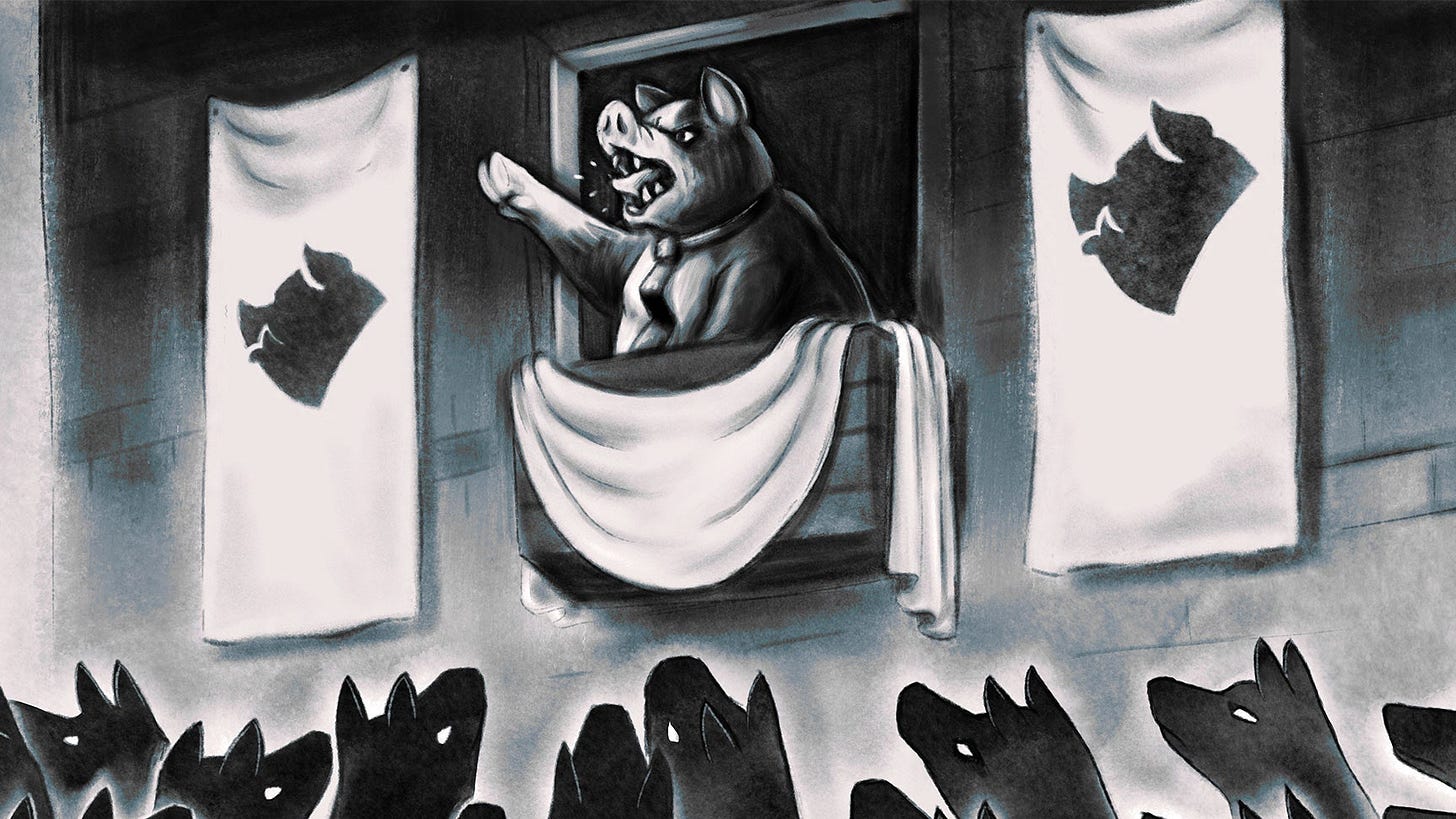
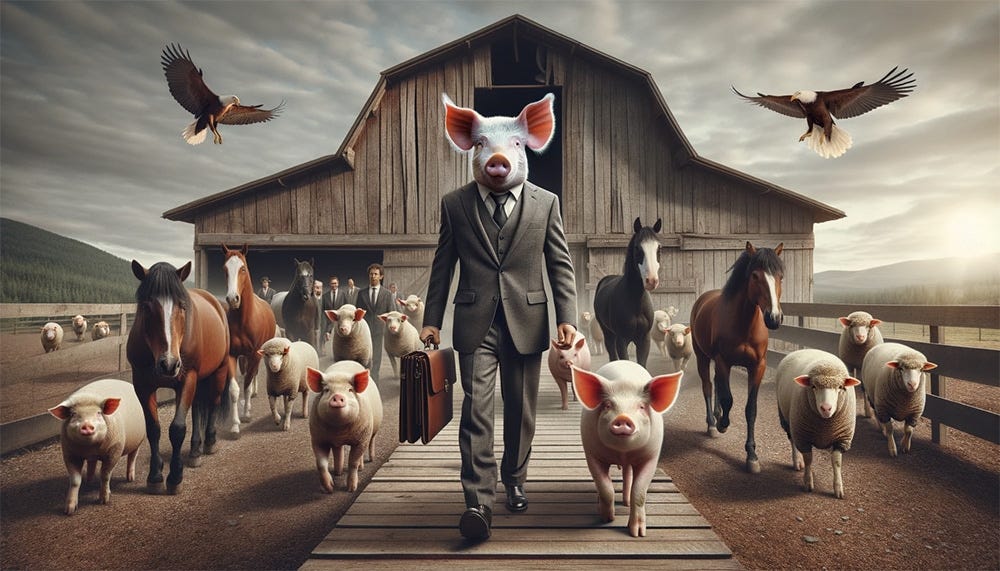
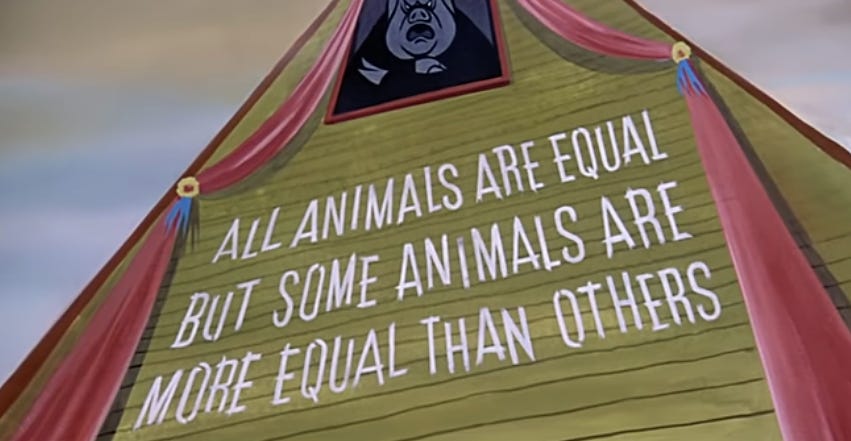
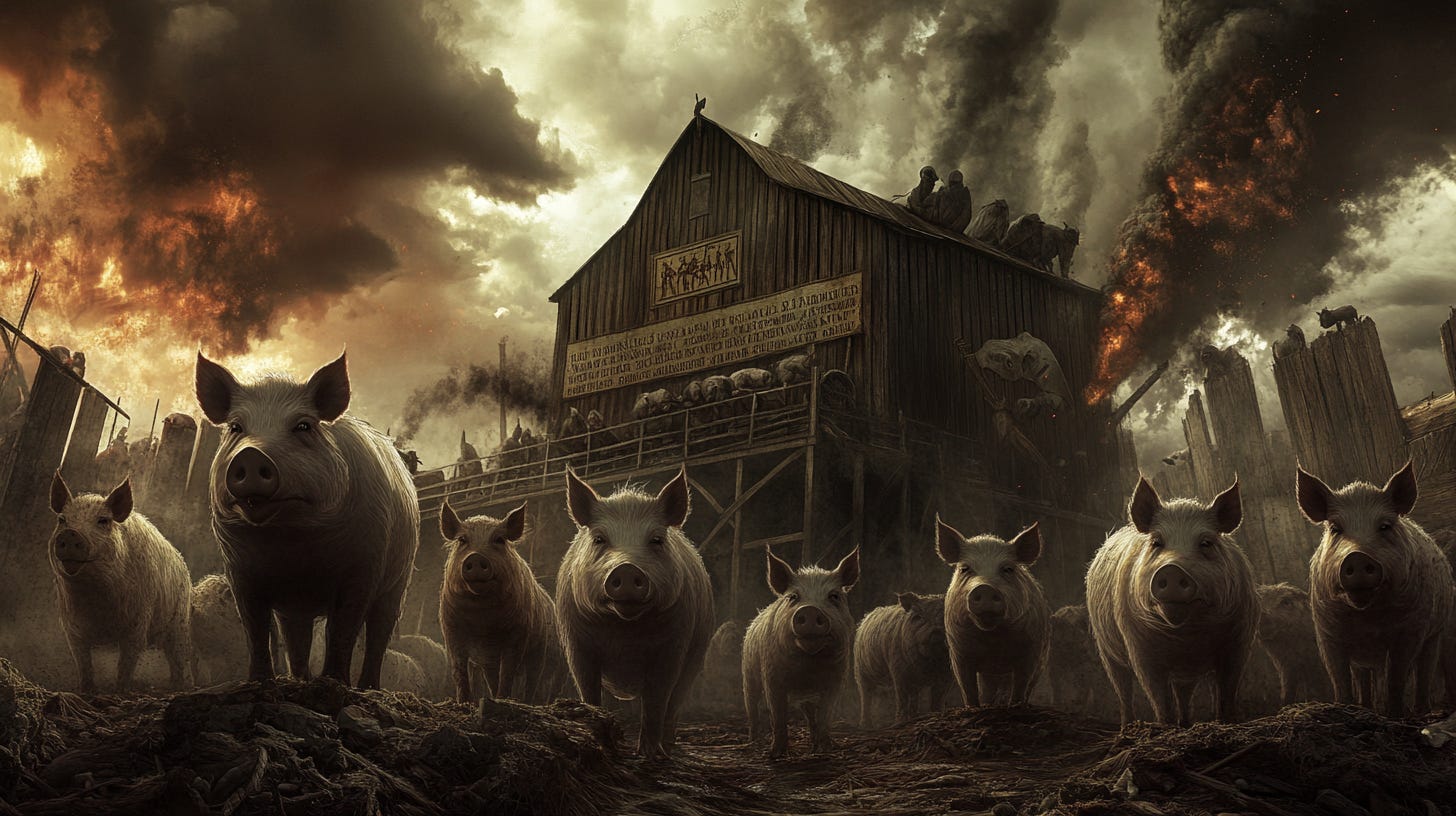
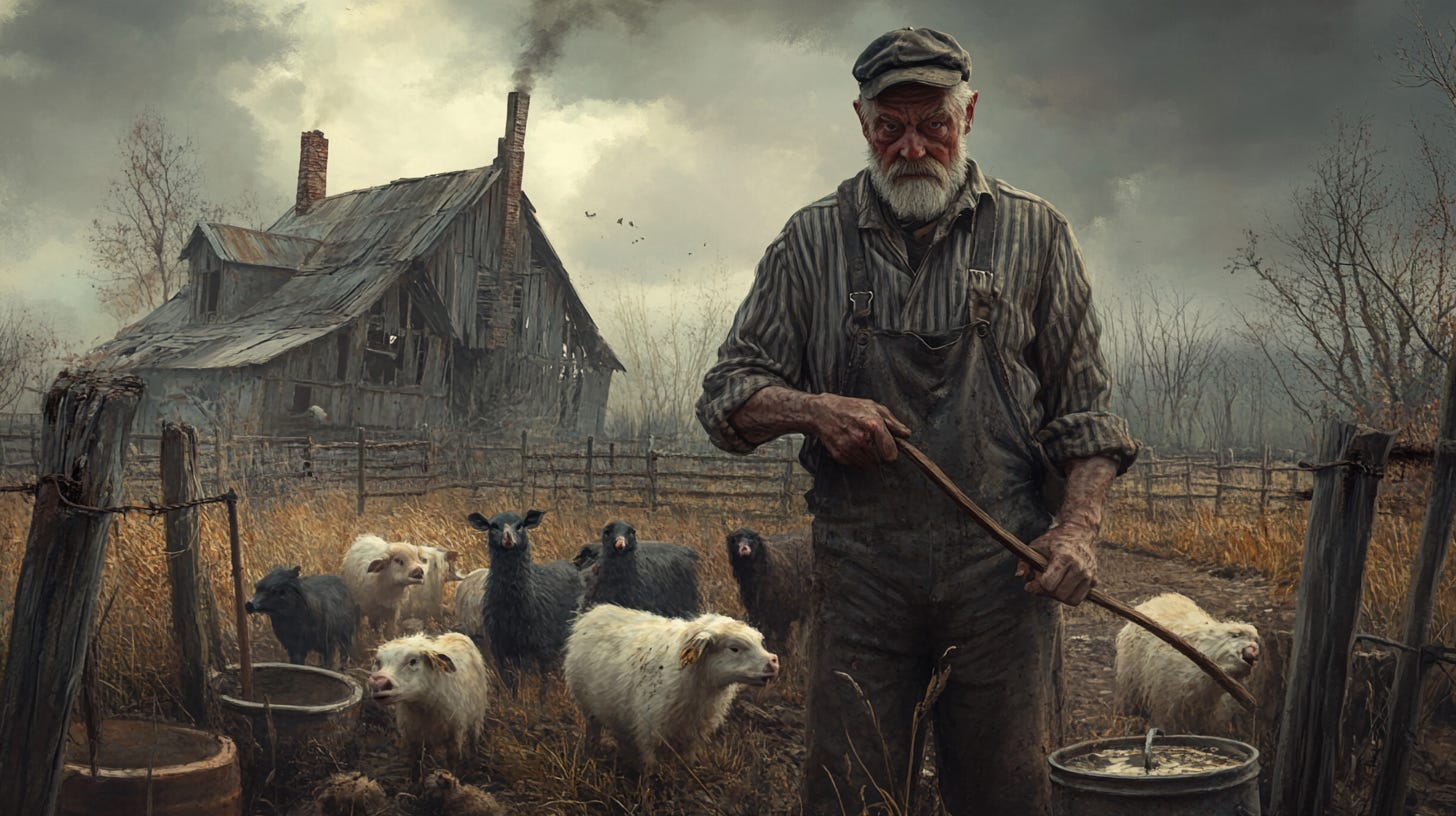
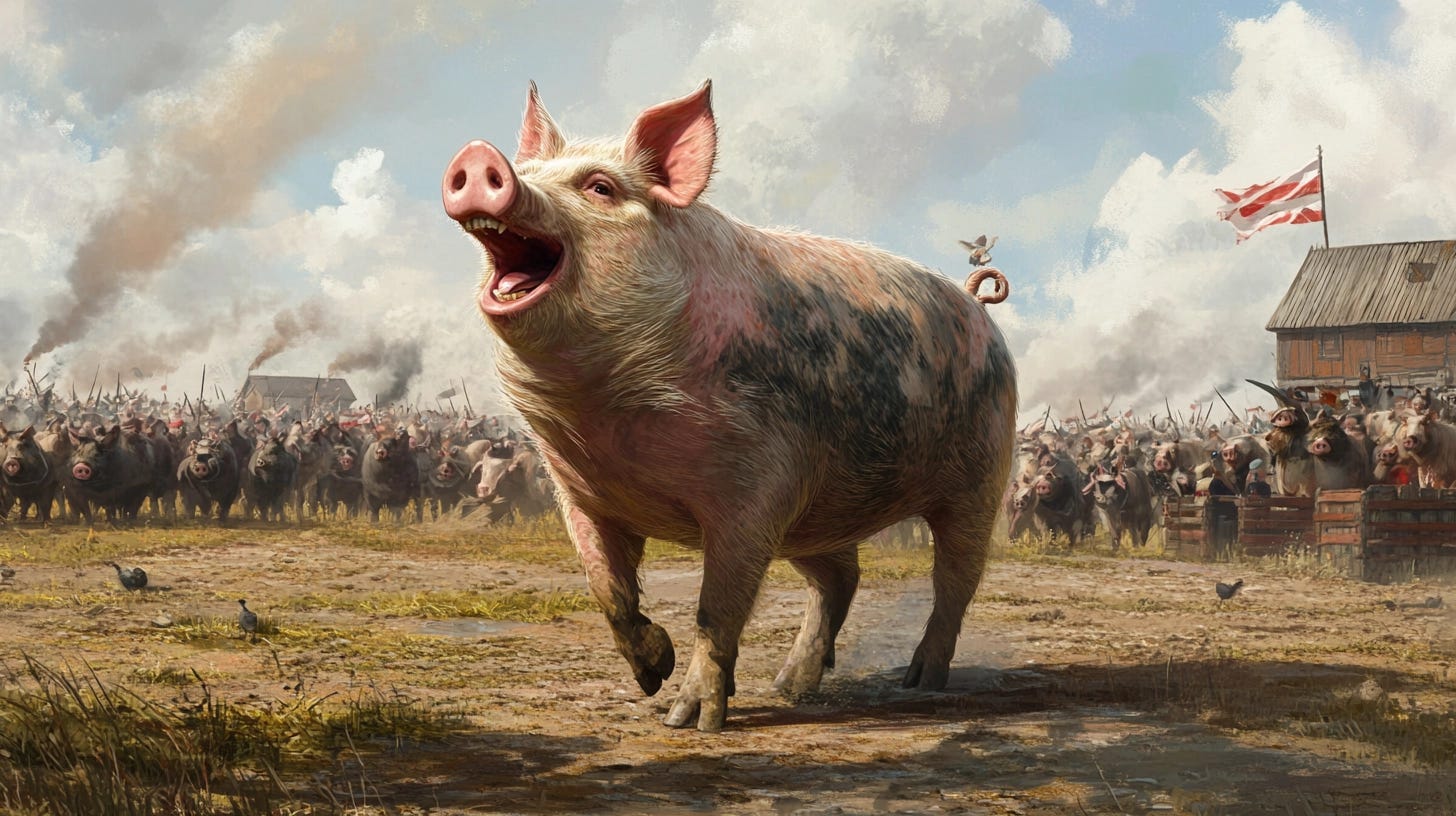
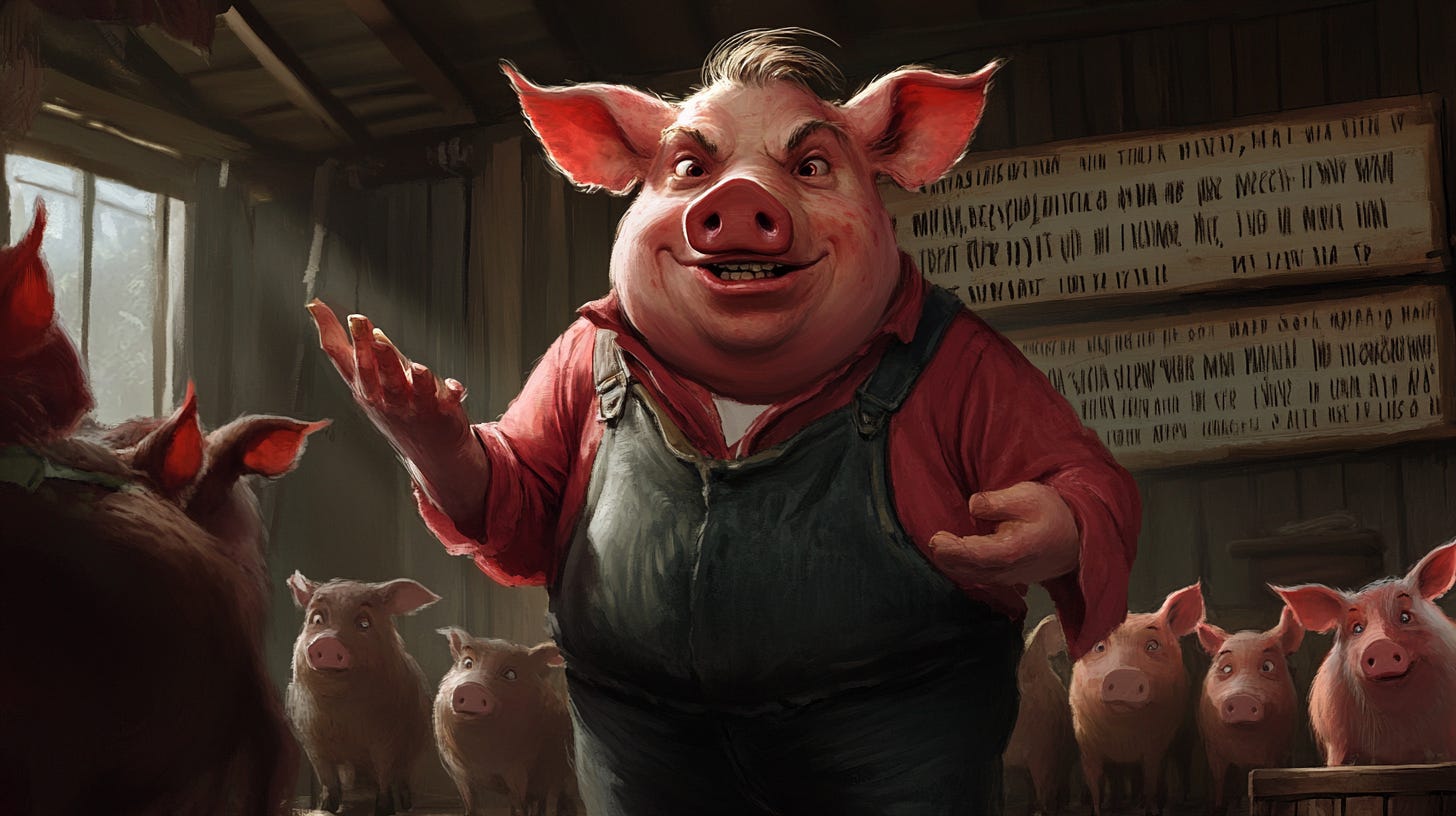
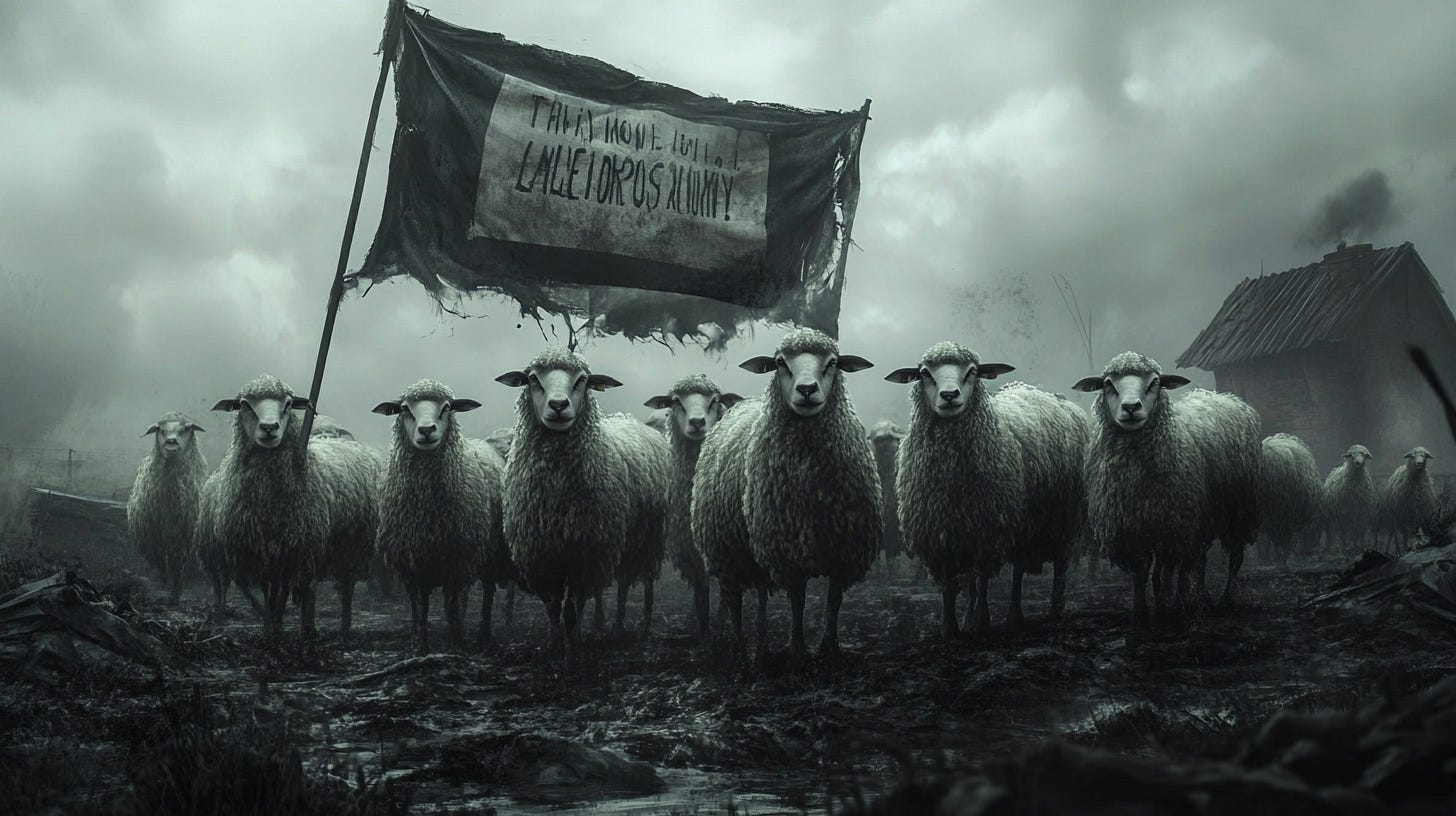
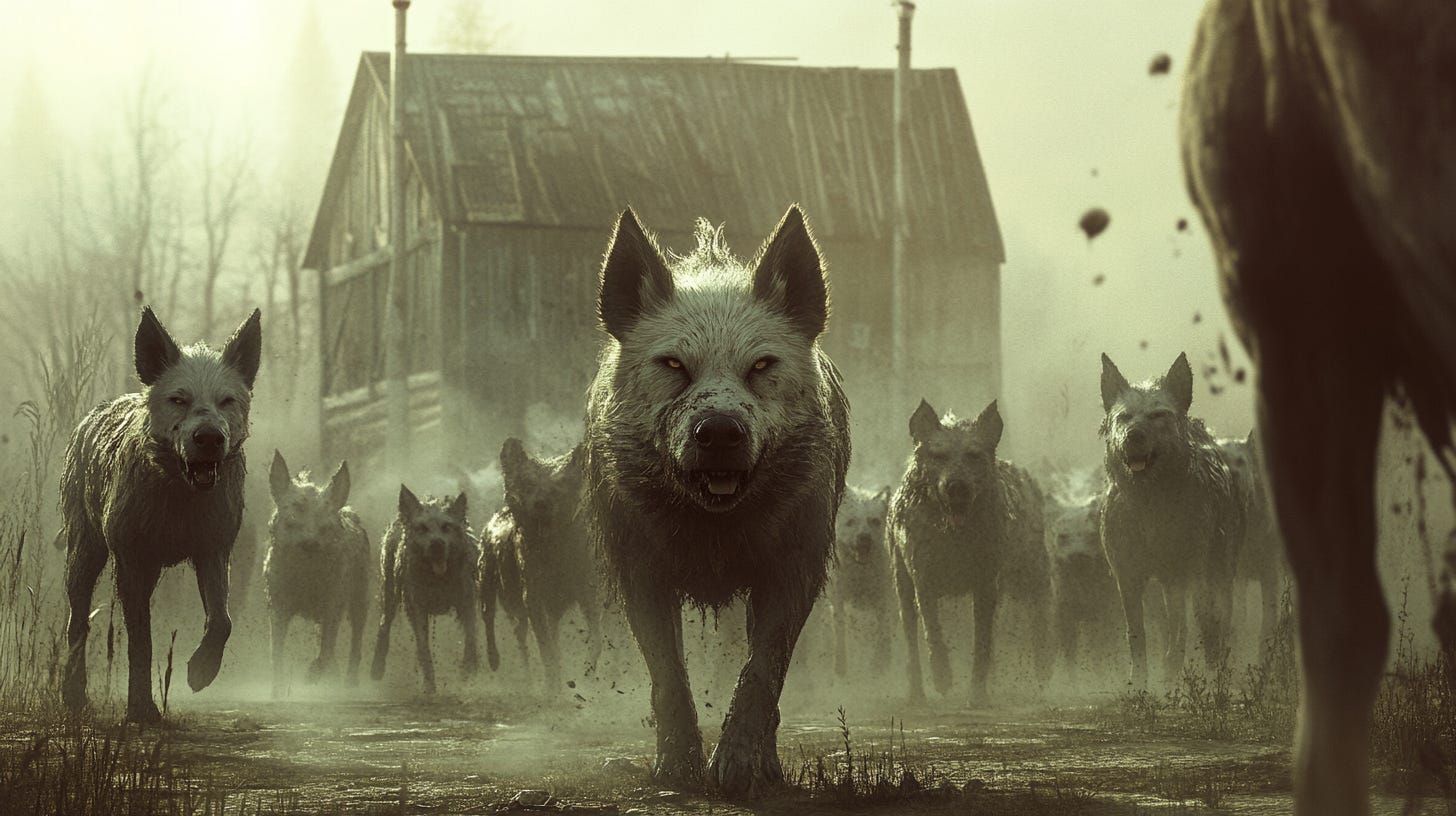
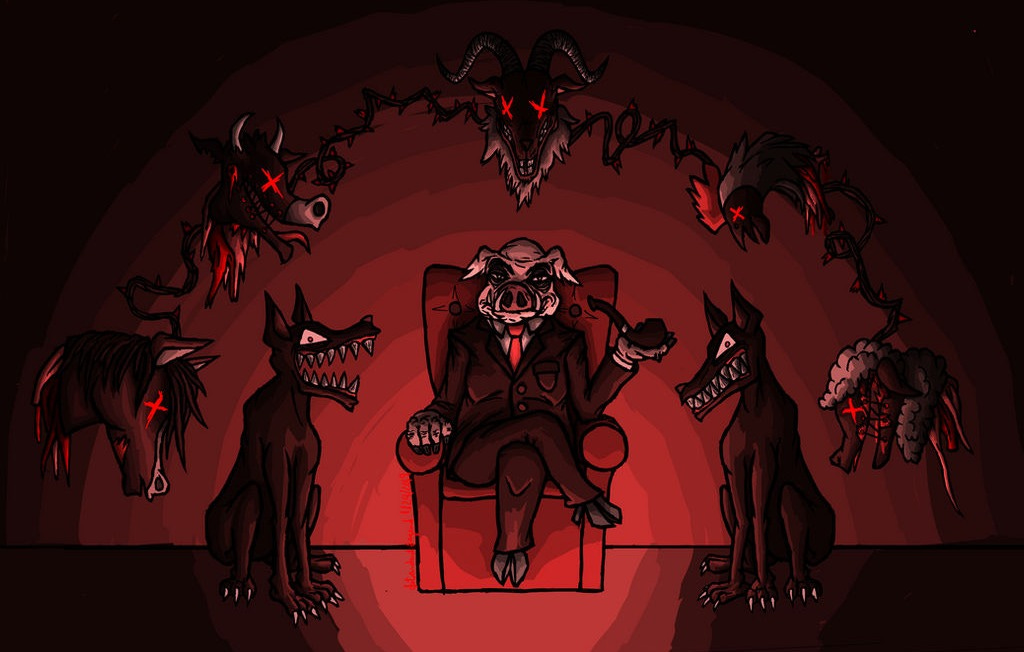
I remember reading this with my class in grade 9 while we were learning about the soviet union/ww2. They changed the curriculum the following year to strictly Canadian history. My sister, who's a year younger than I, didn't learn any of this. We are now in our 30's. Think of all those after who never learned these things in school after my age group and what impact that would have on our society today....